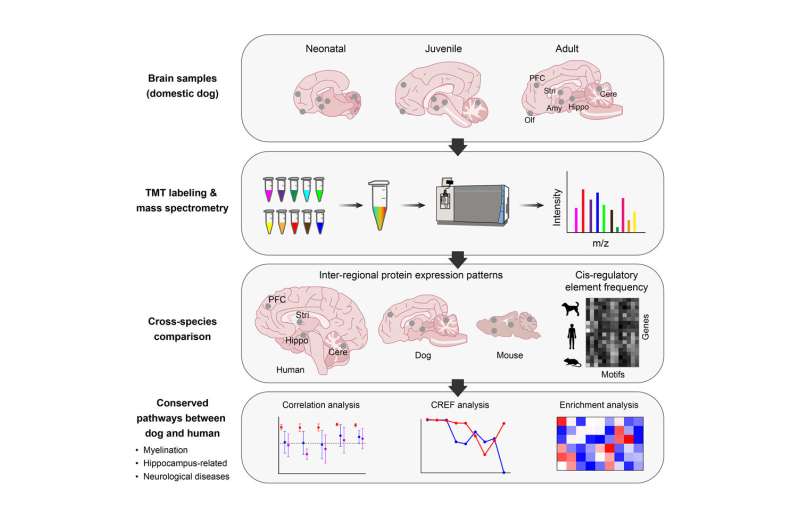Spatio-temporal expression map of whole brain proteome of domestic dogs

With a long history of coevolution and coadaptation with humans, dogs have developed exquisite and complex heterospecific social and cognitive capabilities. Thus, the domestic dog offers a unique opportunity to understand human brain development and function, especially social and cognitive functions.
A research team led by Prof. Zhang Yonging from the Institute of Genetics and Developmental Biology of the Chinese Academy of Sciences has recently performed a comparative study of the postnatal development of human, dog and mouse brains. The study was published online in Molecular & Cellular Proteomics on June 20.
The precise spatial and temporal regulation of the expression of proteins, the executors of biological function, is crucial for brain development and function. Postnatal development is as important as embryonic development. However, only adult human and mouse brains have been systematically analyzed at the proteomic level. The researchers quantitatively profiled the proteomes of six brain regions including cerebellar cortex, olfactory, hippocampus, prefrontal cortex, amygdala, and striatum across three postnatal developmental stages: neonatal, juvenile, and adult.
Their results demonstrated that different brain regions have distinct cytoarchitecture, function and myelination progression. The inter-regional expression patterns of orthologous proteins especially those involved in mitochondria-related pathways were similar between dog and human but different between mice and human. The similarity in protein expressions is consistent with the conserved cis-regulatory element frequency (CREF) modules between dog and human.
“We’ve been working on autism research for more than 15 years. After getting the data, what we really want to know is the spatial expression pattern of psychiatric disease-related proteins among species,” said Prof. Zhang, corresponding author of the study.
Many human psychiatric disorders, in which social cognition deficits are a core feature, have apparent canine analogs. “We identified 328 autism spectrum disorder and schizophrenia (ASD/Scz)-associated protein orthologs expressed in the brains of the three species and showed that the inter-regional ASD/Scz protein expression in dog brain was significantly more similar to that in human than in mouse brain,” said Dr. Hong Huilin, first author of the study.
“This study provides important information to guide mechanistic and translational study for human brain diseases using appropriate animal models,” said Prof. Zhang Yaping, Member of Chinese Academy of Sciences.
Huilin Hong et al, Comparative proteome and cis-regulatory element analysis reveals specific molecular pathways conserved in dog and human brains, Molecular & Cellular Proteomics (2022). DOI: 10.1016/j.mcpro.2022.100261
Citation:
Spatio-temporal expression map of whole brain proteome of domestic dogs (2022, July 13)
retrieved 13 July 2022
from https://phys.org/news/2022-07-spatio-temporal-brain-proteome-domestic-dogs.html
This document is subject to copyright. Apart from any fair dealing for the purpose of private study or research, no
part may be reproduced without the written permission. The content is provided for information purposes only.
For all the latest Science News Click Here
For the latest news and updates, follow us on Google News.

